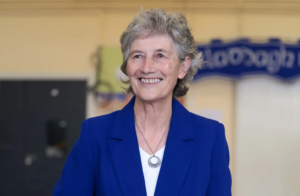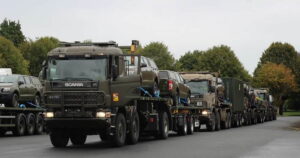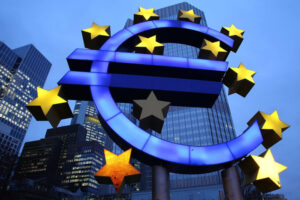
Irish Minister for Foreign Affairs and Trade Helen McEntee approved on Thursday the allocation of EUR 25 million from the country’s budget to the Ukrainian Energy Support Fund (UESF) to assist Ukraine’s critical energy infrastructure, according to the Irish government’s website.
“Ireland is providing EUR 25 million to the Ukraine Energy Support Fund to help Ukraine restore light and heat to people’s homes at a time when they are facing harsh winter conditions. We once again call on Russia to stop these attacks on the civilian population and civilian infrastructure,” McEntry said in Brussels, where she is attending a meeting of the Foreign Affairs Council.
The statement notes that this contribution comes at a time when civilians across Ukraine are suffering from prolonged power, heating, and water outages due to repeated Russian attacks on energy infrastructure, with winter temperatures dropping below -20 °C and many regions of Ukraine are experiencing their harshest winters in recent years.
“The people of Ukraine continue to suffer greatly. These attacks on civilian energy infrastructure have left people without heating at a time when Ukraine is facing freezing conditions. This contribution of EUR 25 million to the Ukraine Energy Support Fund is an important demonstration of Ireland’s continued support for Ukraine. We are determined to do everything we can to alleviate the suffering that Russia is causing in this dark and cold winter. This funding complements Ireland’s existing humanitarian and development contributions to Ukraine,” said Irish Minister of State for International Development and the Diaspora Neil Richmond.
He said Ireland would continue to support Ukraine for as long as necessary while Russia’s aggressive war continues, as well as on the road to recovery and reconstruction.
“Today’s announcement fulfills the commitment made by the government during President Volodymyr Zelenskyy’s visit to Ireland last December to support the restoration and protection of Ukraine’s energy infrastructure,” the statement said.

The Irish government has agreed to reduce the length of stay for newly arrived Ukrainians in state housing from 90 to 30 days, according to national broadcaster RTE.
“Previously, people who fled the war in Ukraine could stay in such housing for up to 90 days. According to the government, if the current trend continues – with about 50 people a day needing 90-day accommodation – all available places could be exhausted as early as this month,” the report said.
In addition, the subcommittee agreed to introduce weekly financial contributions for accommodation in state housing for working asylum seekers. According to Justice Minister Jim O’Callaghan, the mechanism will be developed jointly with Minister of State Colm Brophy and presented to the governing parties in the coming weeks before being submitted to the Cabinet for final approval.
The minister said the fee for residents of IPAS (Interdepartmental Provision of Asylum Services) centers could range from €15 to €238 per week, depending on income.
“Ultimately, it will be a government decision, but we are recommending these proposals and believe they are appropriate,” he said.
O’Callaghan also acknowledged that the number of Ukrainians arriving in Ireland has increased significantly since September, noting that more than 100,000 Ukrainians have arrived since 2022, with about 80,000 currently in the country.

Catherine Connolly, an independent candidate, won a landslide victory in the Irish presidential election, Reuters reported on Saturday.
Connolly, who was backed by left-wing opposition parties, received more than 64.7% of the vote.
Heather Humphreys of the centrist Fine Gael party came in second with 28.2%.
Connolly, a 68-year-old lawmaker from Galway, built her campaign around messages of “peace,” “unity,” and “neutrality.” She comes from the far left of the Irish political spectrum and was supported by Sinn Féin, the Labour Party, the Social Democrats, and other left-wing parties.
Connelly has been highly critical of the United States and the European Union, even though Ireland is largely supportive of the EU. She has expressed her disagreement with the increase in military spending in the EU since the start of the war in Ukraine. Connelly has also criticized the US, the UK, and France for their role in the war in Gaza.
“The Irish president is largely a figurehead who rarely uses her powers to review the constitutionality of legislation, but often speaks on the world stage and invites other heads of state to the country,” Reuters notes.

On Thursday, Irish Deputy Prime Minister and Minister of Defense Simon Harris confirmed the arrival in Poland of two convoys with vehicles from the Armed Forces’ reserves, which will be transferred to Ukraine as aid.
“Operation Carousel 3, led by the Armed Forces Transport Corps, ensured the safe arrival of 34 vehicles at the International Donor Coordination Center in Rzeszów, Poland, as part of Ireland’s contribution to the European Peace Fund. In addition to… vehicles, the convoy also transported three Reacher robotic manipulators, which will be transferred to the Mine Action Coalition… as part of the Ukraine Defense Contact Group (UDCG),” according to a statement on the country’s government website.
According to the information, Ireland transferred two Ford Transit vehicles, three Mercedes ambulances, five Scania 8×8 DROPS trucks, eight 15-seat Ford Transit minibuses, and 16 Ford Ranger double cab vehicles.
It is noted that the vehicles meet Ukraine’s needs, and their transfer will be confirmed in Poland by the Armed Forces and Defense Forces of Ukraine.
As reported in March, the Irish government approved an additional aid package for Ukraine worth EUR 100 million, which will be used to purchase non-lethal military equipment.

The eurozone economy grew by 0.1% in the second quarter of 2025 compared to the previous three months and by 1.4% year-on-year, according to revised data from the EU statistics office (Eurostat). The figures were in line with previous estimates and analysts’ expectations.
In January-March, the eurozone’s GDP grew faster, by 0.6% quarter-on-quarter and 1.1% year-on-year.
Ranking of eurozone countries by GDP growth in Q2 (quarter-on-quarter)
Overall, the EU economy grew by 0.2% in the second quarter and 1.5% year-on-year.
Among the largest economies in the eurozone, Germany and Italy showed a moderate decline, while France and Spain showed significant growth. The largest increase was recorded in Romania, and the largest decline was in Ireland.
This is the second estimate of the change in eurozone GDP out of three; Eurostat will present the final data on September 5.
Earlier, the information and analytical center Experts Club made a video analysis of the prospects for the Ukrainian and global economies. For more details, see the video — https://youtu.be/kQsH3lUvMKo?si=F4IOLdLuVbYmEh5P

On March 27, 2025, under the patronage of the Embassy of Ireland in Ukraine and in cooperation with Project Dandelion, a global campaign for climate justice led by women, a special screening of the film Mrs. Robinson about the first woman President of Ireland, Mary Robinson, took place in Kyiv.
The screening was attended by numerous distinguished guests: heads of diplomatic missions of foreign countries accredited in Ukraine, representatives of the government, including Deputy Minister of Culture and Strategic Communications Andriy Najos, members of the Verkhovna Rada, educators and representatives of the Irish community in Kyiv.
Before the session began, the Ambassador Extraordinary and Plenipotentiary of Ireland to Ukraine, Jonathan Conlon, addressed the audience and briefly outlined the main achievements of the first female President of Ireland, Mary Robinson (1990-1997), a head of state who was and remains extremely popular with the people.
A reformist lawyer and senator at the beginning of her career, Mary Robinson provoked an electoral earthquake by winning the Irish presidential election in 1990.
Later, as the UN High Commissioner for Human Rights (1997-2002), she built a strong legacy and fought fearlessly for human rights around the world.
She subsequently became Chair of the Council of Elders (2018-2024), an independent group of world leaders founded by Nelson Mandela who work for peace, justice and human rights.
She is the recipient of numerous honors and awards, including the Presidential Medal of Freedom from U.S. President Barack Obama.
For half a century, Mary Robinson has been a passionate advocate for gender equality, women’s participation in peacebuilding, human dignity and climate justice.
Source : https://www.facebook.com/UkrDiplomatic?locale=ru_RU